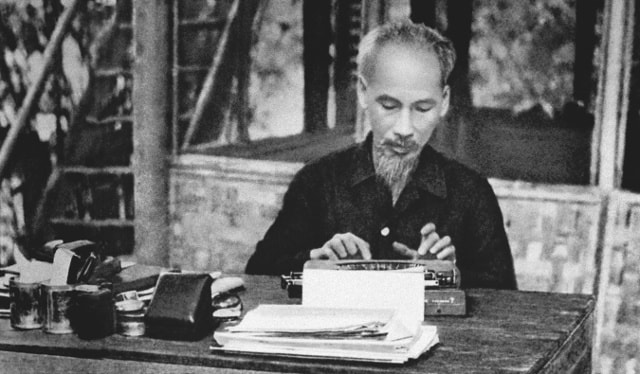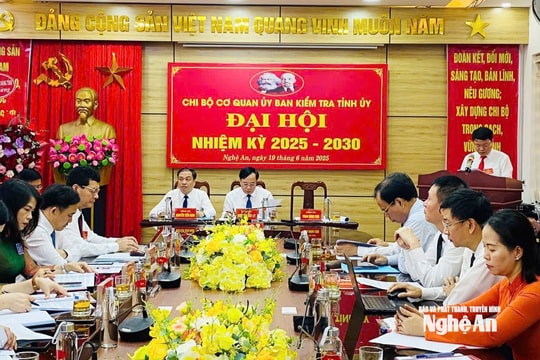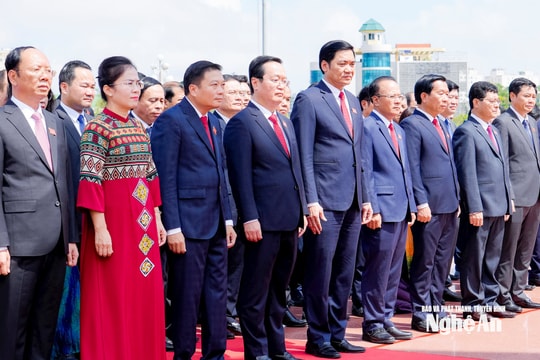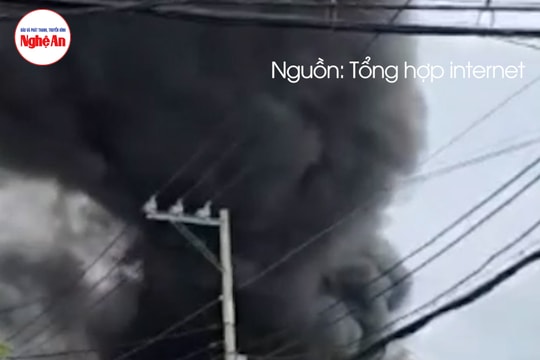Applying Ho Chi Minh's thoughts on journalism and propaganda for ethnic minorities and mountainous areas
During his lifetime, President Ho Chi Minh always paid attention to the form and content of the press, especially the press for ethnic minorities and mountainous and border areas, suitable to the level of awareness, customs, practices, and living habits of the people...
Ho Chi Minh's thoughts on journalism and propaganda for ethnic minority, mountainous and particularly difficult areas
As soon as he secretly returned to the country to lead the revolutionary movement (in 1941, in Pac Bo - Cao Bang), one of the tasks that comrade Nguyen Ai Quoc immediately carried out was to publish the newspaper "Vietnam Doc Lap" in 1941 and the newspaper "Cuu Quoc" in 1942. The initial target audience was compatriots in resistance zones, most of whom were ethnic minorities, then expanded to people in free zones and areas still occupied by the enemy. The purpose was to propagate the revolutionary line; mobilize compatriots to eliminate superstitious practices, develop the economy, and be self-reliant; gradually escape from the grip and oppression of feudalism and colonialism; and at the same time carry out military and enemy agitation work. Because the initial and later main target audience were all ethnic people, Uncle Ho highly valued the simple, practical, concise, easy-to-understand, easy-to-remember writing style, consistent with the awareness, customs and habits of the people. Commenting on this period, Uncle Ho said: “Local people really like to read newspapers, because whatever the newspapers write is meaningful to them. The people also spontaneously organized newspaper reading groups and secretly sent news to the newspapers. The people also found every way to propagate to the soldiers to read newspapers to do military work.”[1].
 |
| During his lifetime, Uncle Ho always cared about ethnic minorities in mountainous areas. Photo: Archive |
The reason why “local people love to read newspapers, because everything they write is meaningful to them” is because Uncle Ho always paid attention to how to write in a way that is appropriate for the recipients, the ethnic people. Regarding this, when giving a lecture at the Central Party rectification class on August 17, 1953, Uncle Ho taught how to write as follows: “For whom do we write? What is the purpose of writing? We must ask the question: Who are we writing for? - Write for the majority: workers - farmers - soldiers. Write for what? - To educate, explain, agitate, criticize. To serve the masses. So what should we write? In this matter, we must also have a firm stance: we, friends, enemies, then we can write correctly.”[2].
Uncle Ho used to be a newspaper seller, a newspaper distributor, an editor and a journalist of the proletariat, so he had a lot of experience in journalism. But with his honesty, simplicity and modesty, when talking about his journalism experience, Uncle Ho only summarized it in a few very complete and meaningful sentences: “If you want to progress, if you want to write well, you must try to learn and practice. My experience is like this: Every time I write an article, I ask myself: Who am I writing for? What am I writing for? How can I write it so that it is easy for the general public to understand, concise and easy to read? When I finish writing, I ask my colleagues to review and correct it for me. Don't be self-conscious, thinking your article is "great". Self-conscious means conceit, and conceit is a fierce enemy that blocks our path of progress.”[3].
As for newspapers for ethnic minorities and mountainous areas, Uncle Ho called them “big-letter newspapers”, meaning the letters must be big, the pictures and photos must be large, beautiful, clear, the content must be concise, easy to understand, easy to remember so that the people can easily absorb and accept them. In the early period, the illiteracy rate among the people was still high, so “big-letter newspapers” were mainly pictures and illustrations of specific people and events for the people to see and tell each other, pass on to each other, from there multiplying typical examples into revolutionary movements. Uncle Ho emphasized: “The mountainous areas of our country occupy an important position for national defense and the economy. Therefore, the Party Central Committee and the Government, directly the Party committees at all levels, local committees, and you, must do everything you can to improve the material and cultural life of the ethnic people... To do that, we must propagate and train well, speak practically and clearly so that the people can easily listen, understand and do well.”[4].
Applying Ho Chi Minh's thought to the practical activities of the press and propaganda system for ethnic and mountainous areas
Studying and applying Ho Chi Minh's thought, over the years, our Party and State have continuously supplemented and perfected the system of viewpoints, policies, guidelines of the Party and policies and laws of the State on press, information, propaganda and communication for ethnic minorities and mountainous areas. In Directive No. 08-CT/TW, dated March 31, 1992 of the Central Party Secretariat "On strengthening leadership and management to improve the quality and effectiveness of press and publishing work", the issue of consolidating and enhancing books and newspapers for mountainous areas was mentioned for the first time. Three years later, in Resolution No. 09-NQ/TW, dated February 18, 1995 of the Politburo "On some major orientations in current ideological work", it emphasized: "Improving the quality and effectiveness of journalism, publishing and other cultural activities", of course including journalism for ethnic minority and mountainous areas. Then, on October 17, 1997, the Politburo issued Directive No. 22-CT/TW "On continuing to innovate and strengthen leadership and management of journalism work", which emphasized: "Reorganizing the press distribution system, ensuring books and newspapers reach readers and viewers, especially in remote areas, border areas and islands".
Thoroughly grasping and applying Ho Chi Minh's thought, the Party's viewpoints and guidelines on the press, over the past 17 years, the Government has approved the Ethnic Committee to implement a special policy of providing a number of newspaper and magazine publications for ethnic minority, mountainous and particularly disadvantaged areas. According to the summary report on the implementation of the "Policy on providing a number of newspaper and magazine publications for ethnic minority, mountainous and particularly disadvantaged areas in the period 2012 - 2015" of the Ethnic Committee, from July 1999 to present, the press policy for ethnic minority and mountainous areas has been implemented in 3 phases. From the initial pilot with only 05 newspapers and magazines, by 2015, there were 24 newspapers and magazines participating in the policy implementation.
During the implementation process, newspapers and magazines have absorbed and have had many creative ways to concretize Ho Chi Minh's thoughts on journalism methods suitable for the specific target group of ethnic minorities in mountainous and especially difficult areas. In terms of content, newspapers and magazines have contributed to spreading the Party's guidelines and policies, the State's policies and laws to ethnic minorities; fostering ideology, knowledge, ethics and national culture; encouraging and guiding compatriots to appreciate, preserve and promote the fine cultural identity of each ethnic group such as language, writing, costumes, traditional festivals, historical and cultural relics, scenic spots, architecture, production tools, religion, beliefs, customs, culture and art; guiding, encouraging and motivating compatriots to live and work according to the Constitution and laws; arouse determination, promote people of all ethnic groups to voluntarily rise up to escape poverty, create social consensus, to successfully achieve the goal: "Rich people, strong country, democracy, fairness, civilization".
In addition, newspapers and magazines have also refuted the propaganda of bad guys and hostile forces distorting the leadership of the Party, analyzed and explained to the people the concern of the Party and State to support comprehensive investment in socio-economic development; hunger eradication, poverty reduction and social security. In 3 regions: Northwest, Central Highlands and Southwest, newspapers and magazines have stepped up propaganda on socio-economic development, hunger eradication, poverty reduction, preservation of national cultural identity; political and ideological education, raising awareness and vigilance against the plots of hostile forces; building 3 regions with enough "immunity" and high "self-resistance" against all plots and tricks of distortion, inciting secession and national division...
Newspapers and magazines are written and edited in a concise, easy-to-read, easy-to-understand, easy-to-remember, easy-to-follow manner, suitable for the intellectual level, cultural identity, customs and practices of each ethnic minority and each different ethnic minority region; pictures and photos have clear themes, tight layout, images are not blurred, and captions contain all necessary information elements. In terms of form, the presentation is attractive; large fonts, beautiful, sharp photos, in the correct format, number of color pages, and paper type are prescribed. Information provided in newspapers and magazines is rich, diverse, reliable and carefully checked before publication, both for long-term preservation for research, reference and exploitation and to improve the reading culture of the people.
Implementing the policy of providing some newspapers and magazines to ethnic minority and mountainous areas, especially difficult areas in the period of 2012 - 2015, tens of millions of newspapers and magazines were delivered to the people. Each newspaper is truly spiritual food for the people, providing useful and correct information, creating trust in the leadership of the Party and State, raising revolutionary vigilance, propagating people not to listen to bad people's instigation, not to cause instability in political security and social order and safety. In general, the cost of printing newspapers is low but the effect is very practical.
Looking back at the press and propaganda work for the mountainous and ethnic people in recent years according to the viewpoints and thoughts of President Ho Chi Minh, we have achieved many important achievements. However, recently there has been public opinion that the program of providing free newspapers for mountainous and ethnic areas in some places is still a formality and has not yet promoted its effectiveness. Regarding this, the Government has recently directed the Ethnic Committee and the Ministry of Information and Communications to review and reduce the number of newspapers that have not promoted their effectiveness; reduce the number of newspapers, but pay more attention to the quality of content and the form of expression appropriate to the level of awareness, customs, habits, living habits, work and production of the people. On that basis, recently, on April 19, 2016, Deputy Prime Minister Vu Duc Dam, on behalf of the Prime Minister, signed Decision No. 633/QD-TTg "on granting a number of newspaper and magazine publications to ethnic minority and mountainous areas, and areas with special difficulties" replacing Decision No. 2472/QD-TTg dated December 28, 2011 and Decision No. 1977/QD-TTg dated October 30, 2013 of the Prime Minister.
This work once again concretizes the thoughts of President Ho Chi Minh and the viewpoints of the Party and State to improve the cultural life of ethnic minorities and mountainous, border and particularly difficult areas, as taught by President Ho Chi Minh: "The mountainous areas of our country occupy an important position for national defense and economy. Therefore, the Central Party and the Government, directly the Party committees at all levels, local committees, uncles and aunts, must do everything to improve the material and cultural life of ethnic minorities"./.
According to the Communist Party of Vietnam








